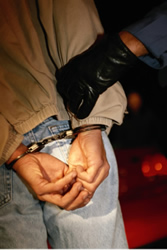Day 217, Chronological Bible Study Timeline. Map. Go to today’s Bible reading (use your browser arrow to return): Jeremiah 48:1-49:13; Obadiah; Jeremiah 49:14-33
The Punishment of Nations
Police arresting citizens, particularly black citizens, is a hot-button issue in America right now. This Bible study is not designed to fuel the flame. All race issues aside, what might be the normal reaction if we saw police officers take someone away in handcuffs? Shock and pity? What if he has committed crimes, is abusive or a troublemaker? Perhaps we might rejoice!
What if we were next? We all recoil at the thought of judgment. We might think, surely not us—we haven't done anything. Besides that, even if we were guilty, we’ve got an alibi, we’re secure, influential, have some money to buy them off, or friends in high places. However, if we’re guilty, we may not be as secure as we think. No person or nation guilty of evil deeds will escape forever—God has set a day and an hour for judgment. We can’t afford to ignore our behavior.
Judgment on Judah's Leadership
Since the death of King Josiah in 609 B.C., the nation of Judah ignored her evil actions. The new world power, Babylon, had already attacked twice and carried away Judah’s kings, nobles, princes, temple treasures, and many of her people. There was still much wickedness, idol worship, and injustice in Judah, but the leadership did not care. They were like poor shepherds who didn’t keep watch over their flocks, so at least they themselves wouldn’t be attacked and devoured by wolves.
Judgment on the other nations: Guilty of Pride
In today’s Bible reading, we see other nations in the Middle East who would also soon fall to King Nebuchadnezzar of Babylon: Egypt, Moab, Ammon (now the nation of Jordan), Syria, Kedar, Hazor (nomadic tribes in the Arabian Desert), and Elam (which is now Iran). They were wicked, proud, and confident. Babylon would soon destroy them, too. However, in God’s grace, he promises to one day restore them.
Edom's Offense
Edom wouldn’t fall now but would fall in the 4th or 5th centuries, B.C., at the hands of the Nabateans, a nomadic tribal nation. God’s judgment may not always be immediate, but it’s certain.
Edom, a nation born from Esau, Jacob’s brother (Genesis 25:25-26), was a neighbor to Judah. He was especially responsible for his wickedness towards Israel because he was related by birth (they were both descendants from Isaac).
There is some debate by scholars as to when the events of Obadiah, concerning the destruction of Edom, occurred. Some think they were fulfilled in the days of King Jehoram when the Philistines and Arabs of Ethiopia came against Judah (2Chronicles 21:16-17). This happened just after Edom’s revolt.
Edom took advantage of Judah. Given the events described in today’s Bible reading (Jeremiah 49:14-33), however, it appears Obadiah refers to Nebuchadnezzar's final attack to destroy Judah in 586 B.C. Edom lets Babylon do the dirty work (i.e., fight the battles) while he waits until Judah is weak. Then, like a vulture, he picks what is left of his brother nation. Some businesses and people do this today; they wait for weakness on the part of others and then swoop in like a vulture to snatch up what they can.
Edom rejoiced at Judah’s fall and did nothing to help. Her leaders were drinking and rejoicing nearby when their brother nation Nebuchadnezzar mauled him. Edom profited from Jerusalem’s destruction, making God angry. Because he stood idly by when Judah was destroyed, and because he rejoiced in her destruction, God vowed to destroy Edom so her people would never be a distinct nation again. This prophecy was fulfilled during the intertestamental period of the Bible when Nabateans (desert tribesmen) drove the Edomites from the land.
Judgment on Edom
“The people of Edom were forced to migrate to southern Judah where they were called In 125 B.C. John Hyrcanus I, a Maccabean, subjugated the Idumeans and made them accept Judaism.” A lesson we might learn from this is to not rejoice in the misfortune of others but help them if we can (Proverbs 24:17-18).
(The Bible Knowledge Commentary of the Old Testament, edited by Walvoord and Zuck, © 1985, pp. 1453-1454)
(The Bible Knowledge Commentary of the Old Testament, p.1198).
Take-Away Lessons
- If we are Christians and act wickedly, we must remember that God will discipline us first before he judges others. We must not be carefree about our lives. We should fear the LORD and continue to walk in his ways if we want his blessings.
- If we are not Christians, remember that God will ultimately judge all nations and people. Today is a good time to turn from our sins and seek the LORD (more...).
- Are we our brother’s keeper? The answer is yes. We aren't responsible for his sins, but we shouldn't sit idly by when calamity comes upon him.
- If we rejoice in the calamity of others. God may withhold their judgment and punish us. Let's fear the LORD and walk humbly before him. We can commit all judgment to God, for he will make all things right in the end.
Focus Verse
Proverbs 17:5 (NIV) “He who mocks the poor shows contempt for their Maker; whoever gloats over disaster will not go unpunished.”
Write a private prayer response to today’s Bible study:
Please send your comments to me, Rod, the author
Looking Ahead: What happens if we Scorn God's Message? That is the topic of discussion in our Next Lesson in the book of Jeremiah.
Back to top of page
Return to Chronological Bible Studies main page
Go to Scriptures main page
Go to Topics main pagere-edited 1-23-23
COPYRIGHT @ 2019, MASTER'S TOUCH BIBLE STUDIES

